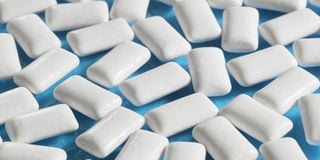Chewing gum more harmful to you than anything else you eat

Chewing gum is not as harmless as it looks. NET PHOTO
What you need to know:
People do not typically ingest gum, so they pay very little attention to its ingredients.
Whenever Gift Kirabo is making a back-to-school shopping list, the first item on her list is chewing gum. The 14-year-old student of St Paul’s College Mbale claims chewing gum helps her concentrate in class.
During the holidays when she is sent to buy something, she spares some change to buy chewing gum to keep herself busy.
Kirabo is not alone, in bars, night clubs and restaurants, it is a common to find someone chewing gum and yet no one is even trying to stop them because we assume it is okay.
Most teenagers, when asked why they chew gum, answers are most likely to range from stress relief, freshening the breath, overcoming food cravings or simply the flavour.
Dr Muhammad Mulongo, the district health officer for Bulambuli District, says there are health risks associated with chewing gum and most are related to excess stomach acid.
Health risk
He says chewing gum stimulates the cells lining the stomach wall to produce digestive (hydrochloric) acid and that this is a natural mechanism to ensure that when food reaches the stomach, there is some acid to begin the digestion process.
“When you begin chewing gum, acid is secreted into the stomach; only this time there is no food being digested. It builds up acid in the stomach which will effectively just bubble in there,” says Dr Mulongo.
“This means as more acid simply sits in your stomach, the greater the chance of developing stomach ulcers,” but quickly adds that this dependent on the amount of gum one chews.
Dr Andrew Kasoro, a paediatrician at Mbale Regional Referral Hospital says when you chew gum, it secretes excess saliva in your mouth and makes the stomach think it is hungry or getting food which poses a health risk.
“I would suggest that moderation is necessary in whichever type of gum you chew however do not encourage children to chew. Very sugary gum is not good for the good of their teeth and the stomach,” Dr Kasoro says.
One thing all these doctors agree upon is that chewing gum causes one to swallow excess air which can contribute to abdominal pain and bloating associated with irritable bowel syndrome (IBS). IBS is a widespread condition involving recurrent abdominal pain and diarrhoea or constipation, often associated with stress, depression, anxiety, or previous intestinal infection.
According to Dr Kasoro, chewing gum will bring an over production of stomach acid which could compromise your ability to produce sufficient digestive secretions when you actually eat food.
Dr Mulongo says some people have developed adverse gastrointestinal symptoms including diarrhoea from artificial sweeteners found in the chewing gum.
Other effects of chewing gum
Before you reach out for another stick of gum, consider these rather disturbing side effects that gum chewing can cause.
Dr Mulongo says chewing gum may increase your junk food intake. Research has shown that chewing gum reduces ones motivation to eat, hunger and how much you end up eating.
“For example, people who chew gum are less likely to eat fruit and instead are more motivated to eat junk food like potato chips and candy. This is likely because the minty flavour in the gum makes fruits and vegetables taste bitter,” says Dr Mulongo.
Dr Marcola says that chewing gum may trigger temporomandibular joint (TMJ) disorder in one’s jaws.
He adds that chewing gum causes jaw muscle imbalance (if you chew on one side more than the other) and even TMJ in your jaw; a painful chronic condition which comes with headaches, earaches, and toothaches over time.
What you are nibbling on
According to online sources, the artificial sweetener aspartame used in making chewing gum is metabolised inside your body into both wood alcohol (a poison) and formaldehyde (which is a carcinogen used as embalming fluid and is not eliminated from your body through the normal waste filtering done by your liver and kidneys).
“If your chewing gum contains sugar, you’re essentially “bathing” your teeth in sugar while you chew away. This can contribute to tooth decay,” one of the resources reads in part.
Effects
Experts say chewing is linked to headaches in teenagers.
Doctors advise that “… if you’re a regular gum chewer, there is compelling evidence that this is a habit you are better off without. From its questionable ingredients to its impact on your teeth and digestion, chewing gum belongs right in the trash – not in your mouth”.
A stick of chewing gum
Before you start chewing that stick og gum, this is what you are nibbling on;
Make up. Chewing gum is made out of Aspartame, BHT (Butylated Hydroxytoluene), Calcium Casein Peptone (Calcium Phosphate), Titanium Dioxide and Gum Base, a kind of petroleum-derived from paraffin wax, polyvinyl acetate (carpenter’s glue) and talc, which are linked to cancer.




